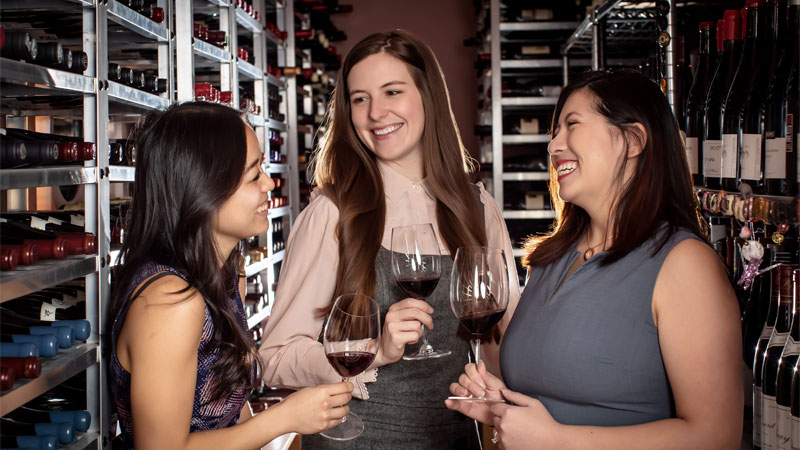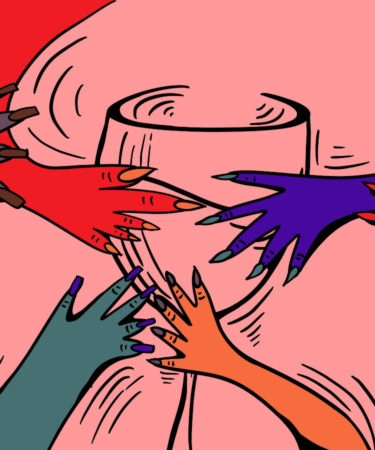Knowledge is priceless, but higher education tends to be really, really expensive. That’s one of the reasons three wine professionals launched Wine Empowered, a nonprofit providing tuition-free education to women and minorities. Co-founders Victoria James, Amy Zhou, and Cynthia Cheng also aim to transform the predominantly white, male wine industry by creating paths to access for women and people of color.
And for good reason. Of the 172 Master Sommeliers certified in the United States, 28 are women, according to the Court of Master Sommeliers. The Court was unable to provide racial or ethnic demographic data, but Wine Empowered co-founder Victoria James surveyed New York City’s Michelin-starred restaurants and found that 83 percent of wine buyers are men and 71 percent are white. “I am here to report that it is that bad,” she writes.
By making their program free, Wine Empowered is removing one of the biggest barriers to entry for anyone interested in wine. The Certified Sommelier Examination from the Court of Master Sommeliers (CMS) costs $595. Programs at the Wine and Spirits Education Trust (WSET) start at $382 and climb to $3,348 as you ascend levels.
“Certifications that help propel people through their career in beverage like the WSET and CMS are cost prohibitive and therefore non-inclusive,” OmoLola Olateju, founder of Black Girls Drink, tells VinePair. She had been researching wine education programs online when she happened upon a tweet about Wine Empowered from one of its instructors, Julia Coney. She plans to apply next month.
“Wine Empowered is important because it contributes to building up a new crop of professionals who will diversify the industry, which has historically been run by men and white people of means,” Olateju adds.

The homogeneity of the industry introduces an array of problems, one of which is a lack of mentorship for those who lie outside of its narrow demographic confines. “When restaurant general managers and corporate leaders are mostly white men, those in power are less likely to mentor minorities or women,” the founders of Wine Empowered write VinePair in an email.
Exclusion might be unintentional, but it has lasting effects on individuals’ careers. After all, mentors invite their protégés to industry events, introduce them to their networks, and nominate them for professional opportunities. Meanwhile, those who haven’t casually received years of invaluable access are scouring LinkedIn for job postings and stalling out in entry- and middle-level positions.
This hurts the wine business as a whole. When the upper echelon of any industry shares the same demographic space — be it race, gender, sexual identity, geography, or any another factor — perspectives overlap and blind spots emerge.
“Let’s cut to the truth: When wine buyers in top restaurants are mostly white men, programs begin to look the same and reflect the values of this singular demographic,” Wine Empowered’s founders say. “It means less wine from female winemakers or winemakers of color, and lists are not assembled with a broader sense of awareness… We believe that the more unique voices at the table, the more innovation and growth that can occur.”
The 12-week Wine Empowered program covers global wine regions and classic producers, varieties, and winemaking practices. Aspiring students can apply for upcoming semesters on Wine Empowered’s website.
Instructors for the current semester include Raj Vayuda, head sommelier of Daniel Boulud’s restaurants; Christy Canterbury, MW; civil engineer-turned-wine entrepreneur Cha McCoy; and Julia Coney, the wine writer and educator whose tweet alerted Olateju to Wine Empowered’s debut.
“In education, it’s hard if students don’t see someone who looks like them teaching,” Coney says. “At the end of the day, education is what’s going to help fuel the industry. You never know what the person who attends will go on to do, and how they could help somebody because they have this foundation.”
The Wine Empowered team agrees. “Simply put, when those in positions of power look like you, it gives you hope. We wanted our students to see their own faces reflected in our teachers. We wanted our students to say, ‘If they can do it, so can I.’ Because they can.”
Members of the wine industry occasionally fret over losing market share to beer, cocktails, or cannabis, but Wine Empowered demonstrates how many more people we could be bringing to the table. Imagine what might happen if we tear down the walls surrounding our gatekeepers. It makes you wonder who built them in the first place, and why.
